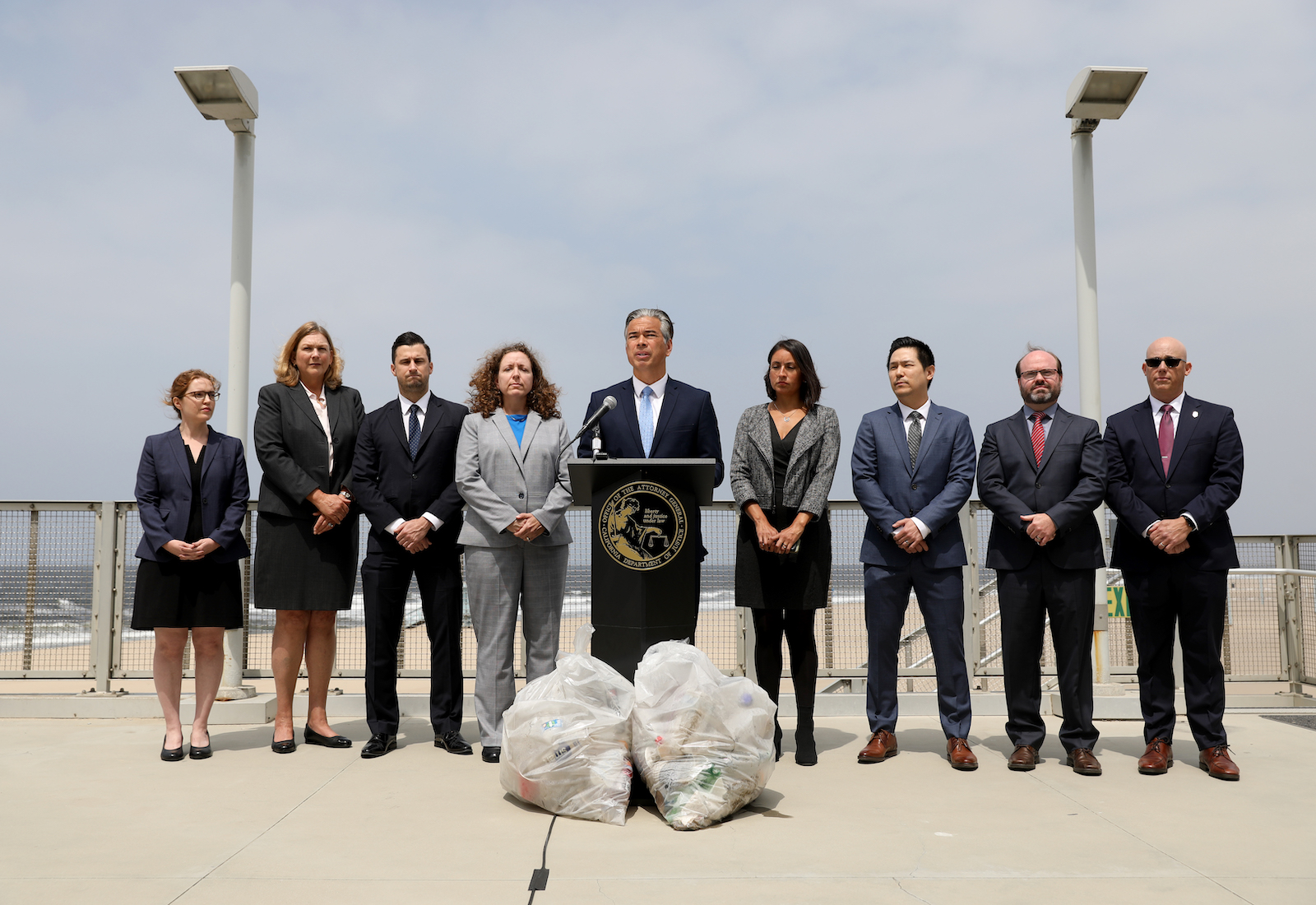In California, prosecutors are launching a new front in the fight against deceptive recycling claims.
The Golden State’s Department of Justice announced Wednesday that it had sent letters to seven top plastic bag manufacturers asking them to substantiate claims that their bags are recyclable. They have two weeks to respond or could face a legal injunction and fines.
“Let’s see the evidence,” Attorney General Rob Bonta said at a press conference in San Francisco. The probe builds on an ongoing investigation into the fossil fuel and petrochemical industry, which his office says has orchestrated a decades-long “deception campaign” to convince the public that plastics are recyclable.
Single-use, non-recyclable plastic bags have been banned in California since 2016, when Senate Bill 270 went into effect statewide as part of an effort to curb growing plastic pollution. The law allows paper or reusable plastic bags, with the stipulation that reusable plastic bags be able to withstand at least 125 uses and be recyclable in the state. The attorney general’s office is now concerned that plastic bag manufacturers are flouting this law by continuing to produce and sell “reusable” plastic bags that are falsely marketed as recyclable.
“Most Californians are under the impression that plastic bags are recyclable,” Bonta said in a statement, attributing this perception to the “chasing arrows” recycling symbol that’s featured on “most every bag we get from the store.” (A separate California law will ban these symbols on non-recyclable materials starting in 2024.) However, Bonta added, “there’s a good chance that most, if not all, these bags are not actually recyclable in California.”
This is because California has some of the country’s most rigorous regulations around the chasing arrows and the term “recyclable.” Under state law, companies can only claim their products are recyclable if they’re collected by recycling programs that serve at least 60 percent of the state’s population, then sorted and ultimately turned into new products. Environmental advocates say plastic bags fail on all three fronts.
“Bags aren’t being recycled anywhere,” said Jan Dell, an independent chemical engineer and founder of the advocacy group The Last Beach Cleanup. According to an analysis she conducted in 2020, California only has the capacity to sort and recycle 1 percent of its waste from plastic films and bags.

California residents can’t recycle plastic bags through their curbside recycling programs, as virtually none of the state’s material recovery facilities will accept them. Companies have argued around this by adding “store drop-off” to their recycling labels, with the idea that consumers could gather their plastic bags and drop them off at a Wal-Mart or some other participating retailer. In theory, the bags would then be picked up and reprocessed at a more specialized facility.
The reality, Dell said, is that “very, very, very few bags are collected in the very, very, very few bins” that have been set up statewide. She’s contested an industry group’s claim that there are more than 18,000 retail locations offering them; while an online directory lists 52 drop-off bins in Orange County, Dell could only find 18 when she tried to visit them. “There is no store drop-off system,” she told Treehugger last year.
What little plastic may be collected through these programs is unlikely to be turned into new plastic products. Recycled plastics tend not to be price-competitive with virgin plastics, and plastic bags in particular must usually be “downcycled” into lower quality material like drainage pipes.
Meanwhile, more than half of Californians erroneously believe that plastic bags are OK to put in their curbside bins, in part because they feature the misleading chasing arrows symbol. These misplaced bags are known as a recycling “tangler” — they clog machinery in recycling facilities, making it harder to process legitimately recyclable materials and even posing safety hazards to workers.
On Wednesday, Bonta said he would remain open to evidence that plastic bags are recyclable. But if Novolex, Revolution, Inteplast, and the four other manufacturers can’t provide substantiation, his office could file an injunction “preventing the illegal production of plastic bags to be used in California.” It could also charge the companies “multi-millions of dollars” in civil penalties for having broken state law.
Novolex said in a statement to Plastics News that it’s reviewing the AG’s letter. The six other companies and two industry trade groups, the American Recyclable Plastic Bag Alliance and the Plastics Industry Association, did not respond to Grist’s request for comment.



